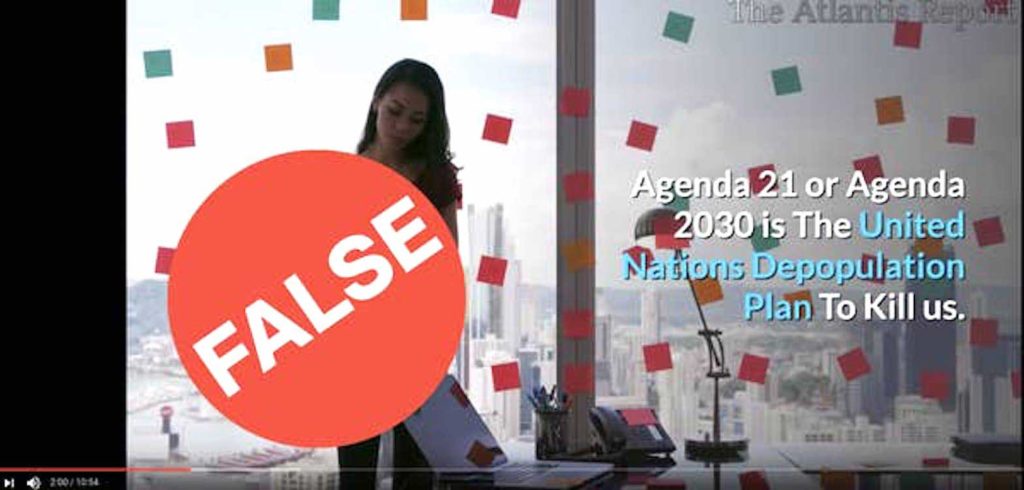An ‘infodemic’ is worsening the pandemic

Misinformation and conspiracy theories like Agenda 21 above is muddying the pool of much-needed information during the pandemic.
After the infamous Bible-waving photo-op at Lafayette Park during which police forcibly removed hundreds of protesters, William Barr the Attorney General of the United States of America declared on national television that police used “… pepper balls… pepper spray is not a chemical irritant. It’s not chemical.”
“He (AG) never heard of ‘OC spray’? My adolescent kibitzer-patient quizzically asked. OCD? “No, oleoresin capsicum silly, it’s from pepper… must be irritating chemical, Google it,” replied the 16-year-old. “I think my mom use it for cooking too,” added the kid.
The Department of Justice chief, the US government’s top lawyer, was simply being asinine, at least to a 16-year-old boy. The AG is an “infodemic” spreader, quipped again my also-media-savvy kibitzer patient.
Conspiracy
“’Infodemics’ are an excessive amount of information about a problem, which makes it difficult to identify a solution,” according to Dr. T. Adhanom, Director-General of the World Health Organization (WHO). The term was coined in 2003 in relation to the flood of information accompanying the SARS outbreak.
An infodemic can be a spread misinformation, disinformation and rumors, which from WHO’s vantage point, pertains to a health emergency like the Covid-19.
Barr’s “non-chemical” OC-spray is misinformation, connoting an implicit lie to cloak a political problem someone in the White House might consider an “emergency.” “Infodemics can hamper an effective public health response and create confusion and distrust among people,” added Dr. Adhanom, to which my older political kibitzer friend interpolated, “often rooted in some kind of conspiracy theories so prevalent relative to current pandemic issues.”
Of conspiracy theories, M. Sullivan of the Washington Post wrote, “In his radio broadcast, Rush Limbaugh came to believe that vitamin C was a possible [Covid-19] remedy; the Chinese government created the virus in a lab; and that our government health agencies were exaggerating the dangers in the hope of damaging Trump politically.”
Conspiracy theories are powerful, according to Dr. K. Starbird, an associate professor of Human Centered Design & Engineering at the University of Washington. “Unlike science, conspiracy theories are uncomplicated and explain a chaotic world in a way that gives the believer a feeling of control.”
“When these ‘theories’ become embedded, however, they can be difficult to refute with evidence,” added Dr. Starbird, whether or not the evidence is irrefutably proven by scientific evidence.
Pernicious
One pernicious outcome: Many Americans are convinced that wearing a protective mask is ineffective, a symbol of left-leaning partisanship. This, despite National Institute of Allergy and Infectious Director Dr. Anthony Fauci’s public advice that wearing a mask is an effective deterrent to the spread of coronavirus.
We are not just fighting an epidemic, we are fighting an infodemic, which spreads faster and more easily than the virus itself, expressed to Dr. Adhanom during a WHO gathering foreign policy and security experts in Munich, Germany in mid-February.
In February President Trump insisted, “We’re going to be pretty soon at only five people. And we could be at just one or two people over the next short period of time… It’s going to disappear…” After four months almost three million have been infected and 150,000 have died.
Cheap
“Information is extremely cheap to produce” while knowledge is expensive to produce, according to Dr. J. Donovan a social scientist and director of the Technology and Social Change Research Project at the Harvard Kennedy School. You don’t need any evidence, you don’t need any investigation, you don’t need any methods to produce it; social media platforms are freely available.
“There’s so much information, it’s so chaotic, and we’re denied our social routines for helping us make sense,” according to Dr. N. Ellison, a professor of information at the University of Michigan. “And the tech itself is shaping the information and the ways we engage with it in a specific way.”
Dr. Donovan stated bluntly, “The coronavirus and the accompanying deluge of misinformation have laid bare a truth about the Internet itself: The early notion that users could be both producers and consumers of information has turned platforms into information landfills, where people are forced to sift through increasingly dangerous garbage in the search for real information.” Platforms, suggested Dr. Donovan, should move beyond moderating to curating information.
The coronavirus has provided an unprecedented opportunity for those who intend to benefit from spreading false information, according to Dr. Claire Wardle, co-founder and director of First Draft, an organization dedicated to tackling misinformation globally. The pandemic has also united fringe activists and conspiracy theorists around a common distrust of institutions like public health organizations and other government agencies, Dr. Wardle added.
Mythbuster
The WHO has created its own “mythbuster” to work with search and media companies like Facebook®, Google®, Pinterest®, Tencent®, Twitter®, TikTok®, and YouTube® to counter the Covid infodemic.
“Our common enemy is a virus, but our enemy is also a growing surge of misinformation. So to overcome this virus, we need to urgently promote facts and science,” explained WHO’s Dr. Adhanom. “We also need to promote hope and solidarity over despair and division.”
Dr. Carson-Arenas is a Certified Clinical Psychology Specialist, and a former university research director. He is a Behavior Analyst Specialist in Nevada, an educator, clinician, researcher, consultant, columnist and a published author. Dr. Carson-Arenas together with his daughter Abbygale Williamson Arenas-de Leon authored, “You’re Okay, I Am Perfect (How teens and adolescents & those in between quest for identity)” available in print and digital. Please e-mail at: docaggieS@yahoo.com

